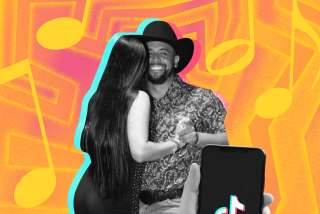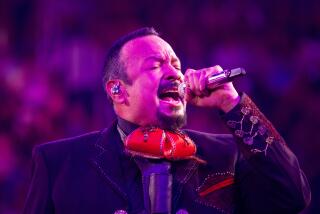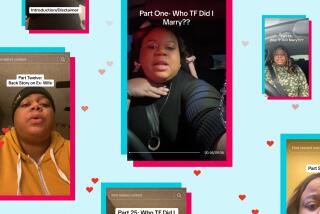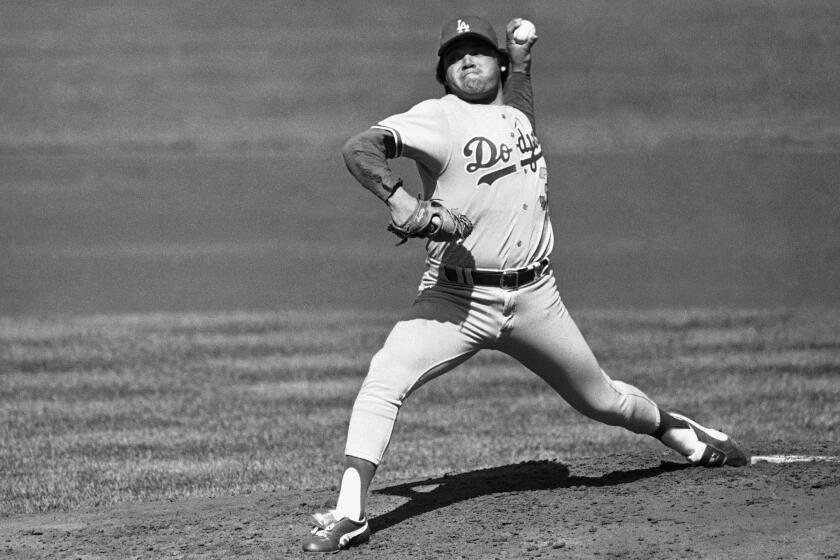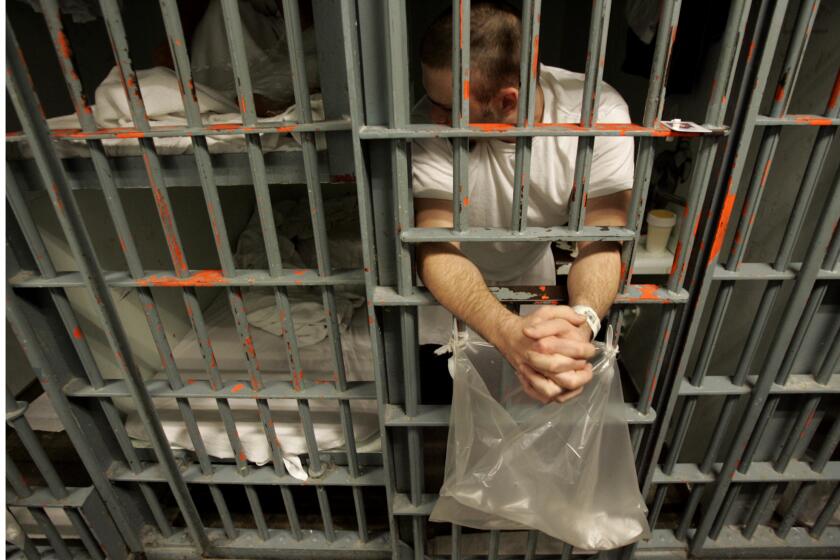How Latino dads are using TikTok to connect with their children
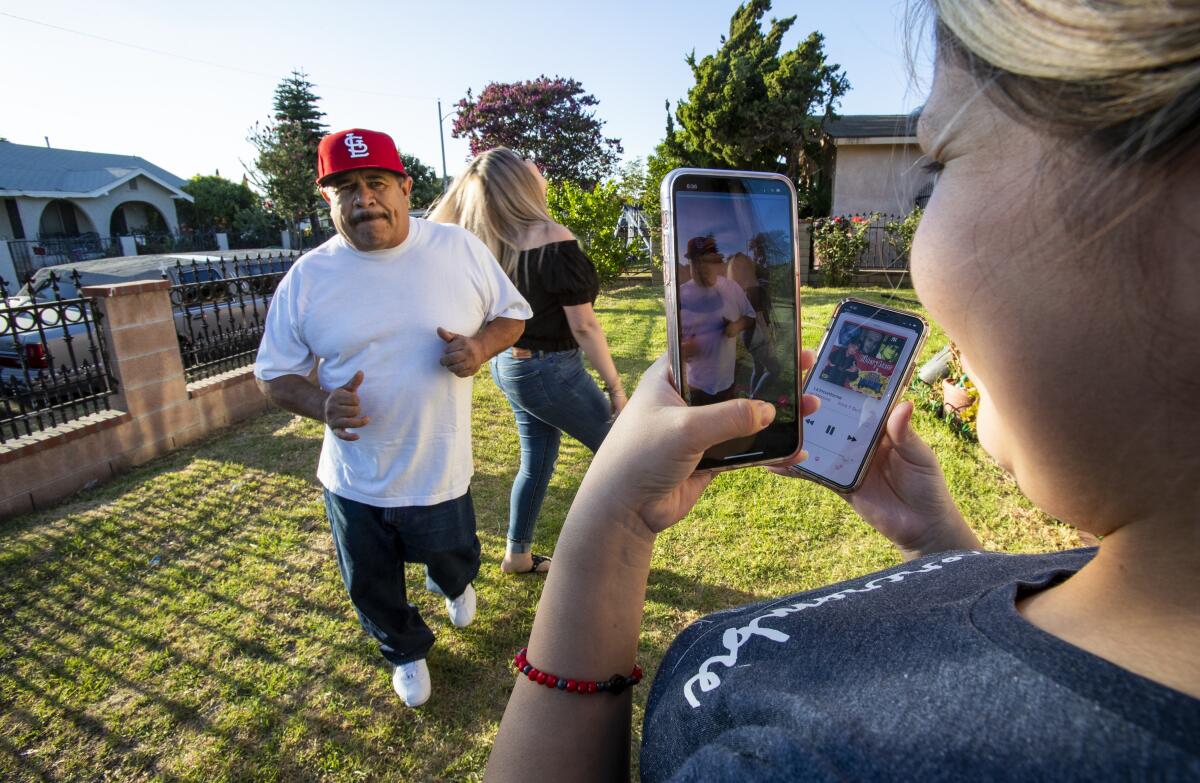
Wearing a sultry look on his face and a long, curly gray wig, Genaro Rangel pulled his fake hair out of a ponytail and whipped it dramatically over his shoulders.
“¡Qué pasó!” exclaimed Rangel, a burly, mustachioed handyman, as he yanked off the wig in his Santa Ana dining room. “It’s me!”
His daughter, Wendy, burst into giggles as she recorded a shaky cellphone video for TikTok while her dad did an off-tune impersonation of Mexican legend Marco Antonio Solis, aka “El Buki.” She would post it with the words, “I’m dead,” and the hashtag #mexicandadsbelike.
Wendy Rangel, 22, often films her father, a natural jokester originally from the Mexican state of Baja California, because he does not mind making himself the butt of a joke on a social media app that he barely understands. If it makes his daughter happy? He’ll do it. Enthusiastically.
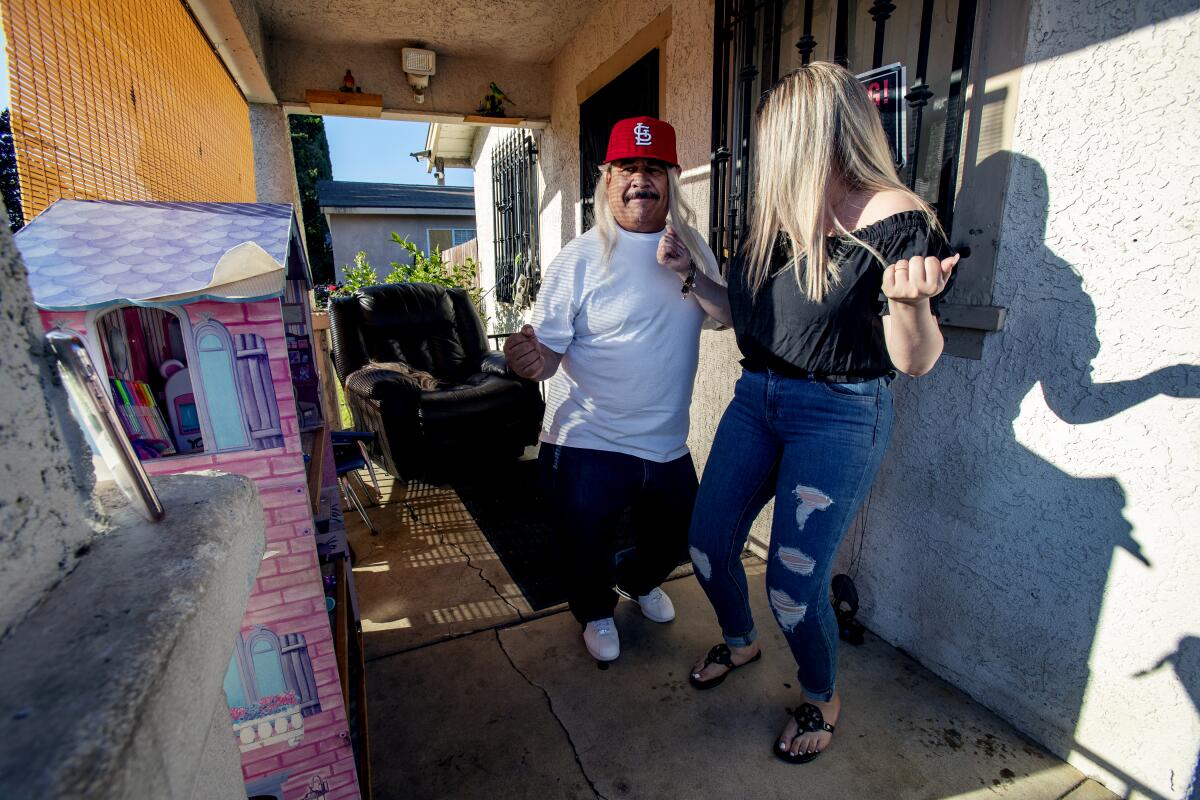
Rangel is one of a growing number of middle-aged Latino dads making appearances on TikTok, the app best known for its goofy teen videos. From papis strutting in heels and a crop top to apás joining in on skits to papás jokingly swearing in their accented English, Latino dads are racking up the likes and views from users who see their own families reflected in the short, often candid clips.
“People don’t really see this side of their dads,” Wendy Rangel said. “Most dads don’t like being recorded and they’re more protective about what people think about them. My dad doesn’t have a filter. He doesn’t care about being tough. He just likes being himself.”
And the comments under her videos, like, “Your dad reminds me a lot of mine,” and “I swear Mexican dads are straight up comedy” are proof that others relate.
These TikTok dads defy the stereotype of the machista Latino father, and their growing presence on the app shows a cultural shift within immigrant families, said Alexandro Gradilla, a professor of Chicano Studies at Cal State Fullerton.
Although there is a traditional culture of respect tied to family life in Mexico and Latin America — often embodied by the use of the more formal Spanish-language pronoun “usted” over “tú” when referring to parents — the videos highlight a type of fatherhood that is more open and lighthearted, Gradilla said.
“One of the things that these men have experienced when they cross the border is that they don’t want to be loved out of obligation or respect,” he said. “They just want to be loved.”
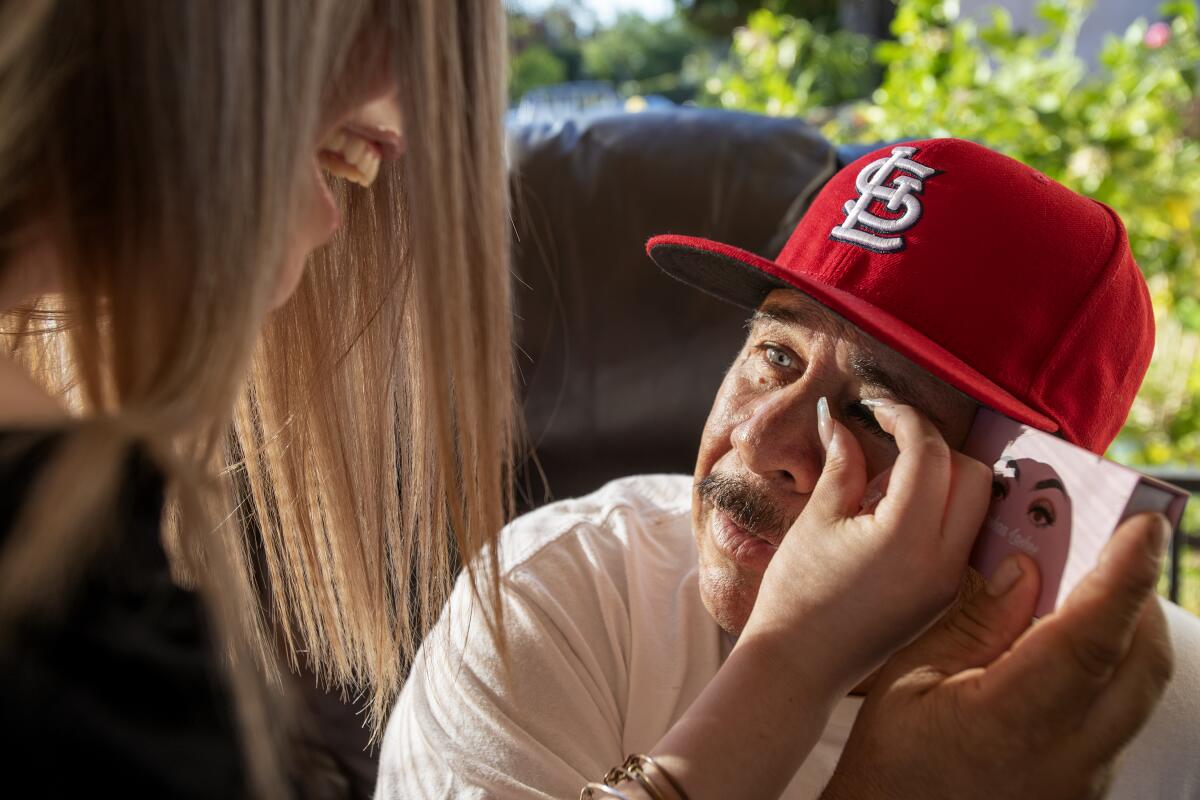
Genaro Rangel’s TikTok appearances defy stereotypes of hypermasculinity, as he doesn’t mind being recorded in wigs or batting his eyes while showing off the fake eyelashes that his daughter sells.
“Hijo de su madre, todavía las traigo,” he told The Times, laughing. “I haven’t been able to take them off!”
Genaro said making TikToks had allowed him to develop a tighter bond with his daughter and granddaughter — and, well, “it’s fun,” he said.
“You have to face life with a smile,” he said. “If you get bitter, you make everyone else bitter too.”
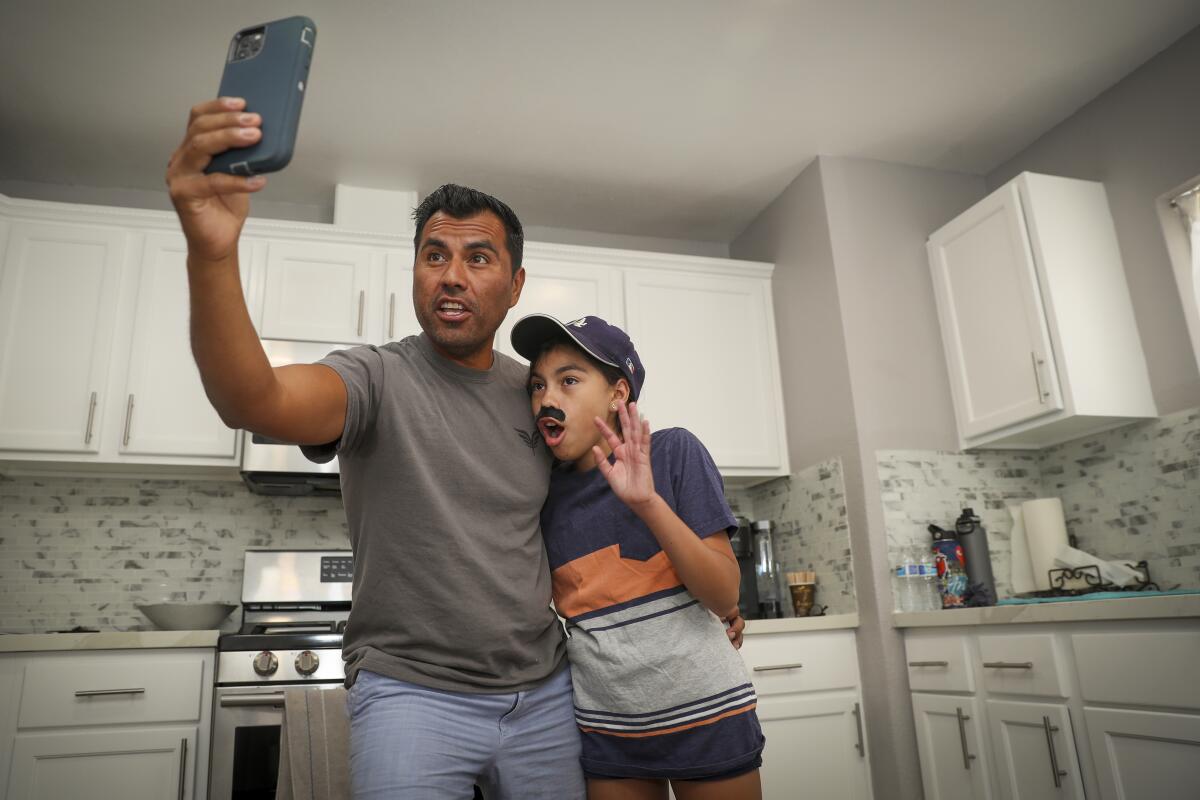
TikTokker Vicente Avila, a 46-year-old immigrant father of three known on the app as Vinny the Twister, is the indisputable papá de TikTok, with more than 1.5 million followers and signature phrases, “See you later, alligator!” “Pshht!” and “Check it out!”
Avila’s following on the app skyrocketed last year as he documented his daily life — making quesadillas for his kids, heading to work in his old truck and buying elotes from street vendors. Now, he features his children in skits poking fun at Americanized dads and and a series titled “Parents’ Favorite Kid” where his 12-year-old twins, Monse and Beto, act out fictional scenarios in which his son gets preferential treatment over his daughter.
“I came to this country in the same way that so many Latinos do,” said Avila, who crossed the U.S.-Mexico border in the early 1990s. “So they feel identified with me, and I identify with them.”
For Avila, his videos have allowed him to have a close relationship with his children — something he never had with his own father in his native town of Tala, Jalisco, in Mexico.
“My parents were always busy working and more worried about what they’d bring home for dinner,” Avila said. “I felt like I never had that connection when I was young.”
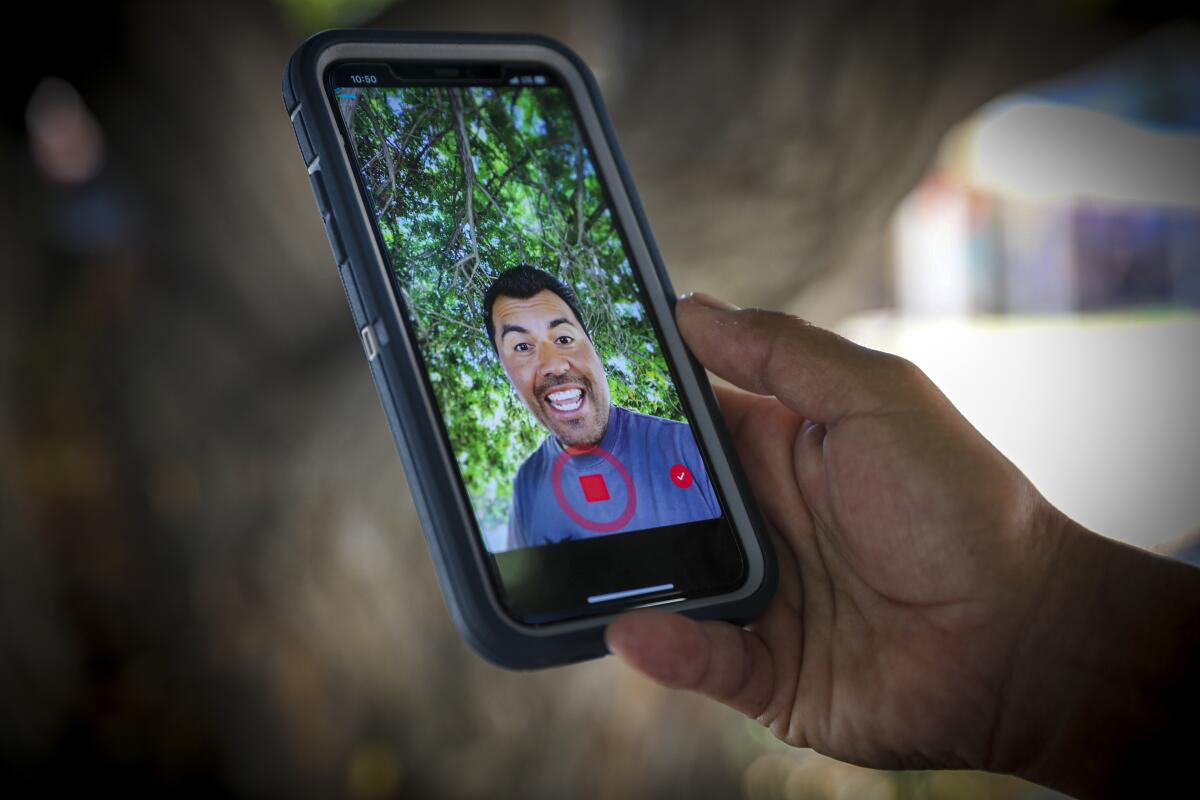
Avila said the app had allowed him to break the barriers of raising kids a la antigua (the old way) and instead use new media to better connect with the youth.
“With my dad, we can just be ourselves and be funny,” his 15-year-old daughter, Abby, said. “I call him a little kid because he’s just adorable.”
Well-respected Latinx influencers on the app have tapped into the trend of featuring their dads. TikTokker Marlene Mendez, who grew up in Bell Gardens and has garnered more than 8 million likes on her videos, showed her dad, Luis, lipsyncing “Estoy Enamorada” by Yolanda Perez and Don Cheto — about a dad not allowing his daughter to speak to her cholo boyfriend.
“¿Cómo que tienes novio y yo no lo sabía? Con razón en el teléfono, ahí ‘tas todo el día,” Don Cheto raps. “How do you have a boyfriend without me knowing? No wonder you’re on the phone all day.”
Convincing Luis to join in the fun was the difficult first step, but once he was on board, the two couldn’t stop laughing as they watched the bloopers, Mendez said.
“Sometimes, they don’t like to look like se les baja lo hombre” (their masculinity drops), Mendez said. “But I feel like when they see videos like this, it changes their perspective.”
Other videos with papás have used lyrics from El Chapo de Sinaloa’s “Le Hace Falta Un Beso” as background audio while users showcase their dads’ construction work or mimic their dads’ work outfits in a silly yet lovable tribute: He works late so she’s never in need / In her love nest she waits for him.
The lyrics and videos highlight the narrative of Latino men as the traditional breadwinners but honor them in a modern way, Gradilla said.
“They realize they don’t have very much in terms of material possessions, and all they do have is their family,” he said. “And that’s something they value, even as they struggle to understand their more American-oriented children.”
TikTokker Enrique Iñiguez’s dad, José, epitomizes that shift. He has become a sensation among Latinos in the LGBTQ community. In his most viral videos, José identifies female celebrities like Ariana Grande and Salma Hayek and answers whether he thinks they’re pretty. The shock for many viewers came when Enrique showed him male makeup artists with full makeup and eyelashes. José answered without judgment.
“Se pinta bien chukis el vato,” he said of millionaire makeup guru Jeffree Star. “He does his makeup very well.”
“Está bonito. Sí como no,” he said of makeup artist James Charles, whom his daughters watch religiously on YouTube. “He’s pretty. Of course he is.”
That video has nearly 500,000 likes and thousands of comments calling José “woke” or calling for “más papás así!” “More dads like this!”
“What better way to show the world that not every Latino dad is homophobic via these TikToks?” Iñiguez said. “That’s why we’ve been doing them.”
More to Read
Sign up for Essential California
The most important California stories and recommendations in your inbox every morning.
You may occasionally receive promotional content from the Los Angeles Times.
